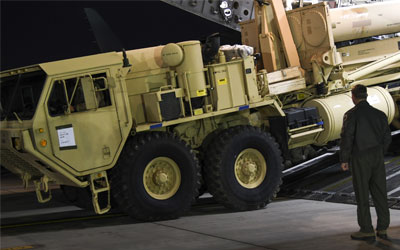A national security expert on Thursday called on South Korea to consider putting on hold the ongoing deployment of a U.S. missile defense system on its soil until China stops its stepped-up retaliation on Korean goods and businesses.
South Korea and the United States recently started the process of installing a Terminal High Altitude Area Defense (THAAD) system to cope with the North's missile threats.
China, along with Russia, has voiced strong objections, claiming that the missile shield equipped with a strong radar could be used against its military. Beijing has been intensifying its retaliation against South Korea mostly in the business, culture and tourism sectors.
"The government needs to consider suspending the THAAD deployment process at least until the U.S. steps in and stops China's retaliation against South Korea," Hong Hyun-ik, a senior researcher at the Sejong Institute, told a seminar.
"Even after its deployment is finished, the government should seek to maintain friendly ties with China and Russia by declaring that it will ask for the withdrawal of THAAD once the country completes developing its own missile defense system," he added.
Hong said that THAAD provides a "limited" role in defending South Korea against the North's nuclear and missile threats but only helps the U.S. and Japan strengthen their deterrence against China.
"(Against this backdrop), it is unreasonable for South Korea to take the brunt of China's economic retaliation," he said.Calling into question the effectiveness of THAAD, Hong argued that the best way to counter the threats from the North is to augment the Seoul-Washington defense treaty in a way that guarantees that its ally "swiftly" and "automatically" responds with nukes to any nuclear provocations.

"If that is hard to be guaranteed, it is necessary to reintroduce tactical U.S. nuclear weapons either temporarily or conditionally," he said.
When Seoul gets confident that it is capable of keeping the North's threats in check, the expert said that the government should seek to resolve the nuclear stalemate by resuming the long-halted six-party denuclearization talks.
Talks should be carried out initially with an aim to freeze the North's nuclear program and then move forward to South Korea-led negotiations to induce a Korean Peninsula peace treaty and Pyongyang's renouncement of its nuclear ambitions, he added. (Yonhap)

